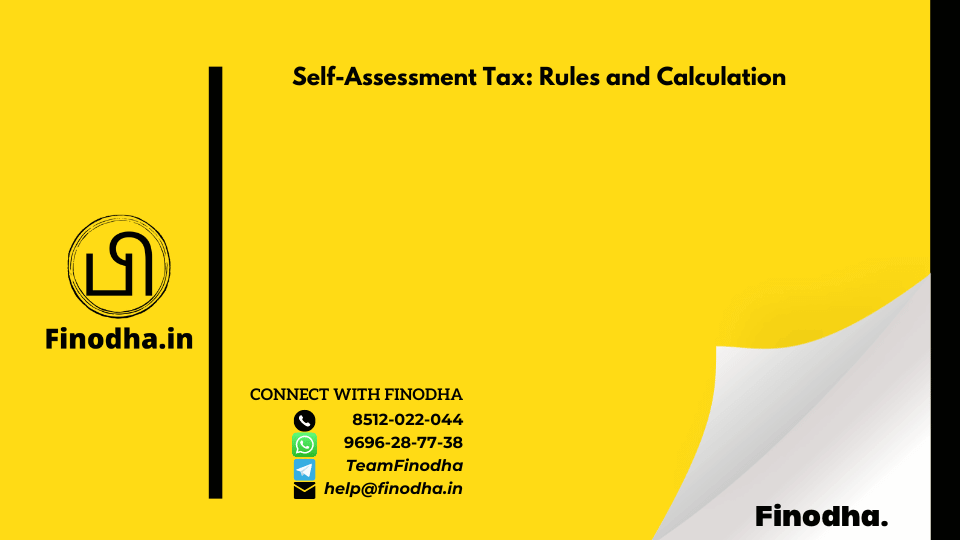Important Keyword: Self-Assessment Tax.
Table of Contents
Self-Assessment Tax: Rules and Calculation
In India, about 7.5 crore people file income tax returns every year. However, only 30% of these filers actually pay income tax, which means just 1.6% of the entire population contributes to income tax payments. The government collects taxes through various methods like TDS (Tax Deducted at Source), Advance Tax, and Self-Assessment Tax. The Self-Assessment Tax is a system where taxpayers calculate their own income, determine their tax liability, and pay any remaining tax owed to the government.
What is Self-Assessment Tax?
Self-Assessment Tax is the amount paid by a taxpayer on their net taxable income after accounting for Advance Tax and TDS (Tax Deducted at Source) for the relevant financial year. To complete the return filing process, taxpayers need to pay any remaining taxes. If the required amount isn’t paid, the return filing process is considered incomplete, and you might face penalties, interest, or other unfavorable consequences.
Although there’s no specific due date for paying Self-Assessment Tax, it’s advisable to pay it promptly and proceed with filing your Income Tax Return (ITR) to avoid any issues.
Who has to pay Self Assessment tax?
It is applicable to taxpayers in the following situations:
- Shortfall in Advance Tax Payment: When the advance tax paid is less than the actual tax liability.
- TDS Issues: When TDS was not deducted or was deducted at a rate lower than the applicable rate.
- Job Change Scenarios: When a salaried individual changes jobs, and the new employer does not consider the salary from the previous employer while calculating TDS.
- Undisclosed Income: For salaried individuals, if there are other sources of income, like interest from fixed deposits or mutual funds, which were not taxed and not disclosed to the employer.
For example, consider Shreya, who earns 4 lakh rupees from her salary. Besides her salary, she also has an interest income of INR 1,20,000, which she did not inform her employer about. In such cases, Shreya would need to pay Self-Assessment Tax on the interest income.
| Income | Amount |
| Salary | 4,00,000 |
| Interest | 1,20,000 |
| Total Taxable Income | 5,20,000 |
| Total Tax Payable (as per the old regime slab rate) | 16,500 |
Note: Since Shreya’s total income exceeds INR 5 lakh, she is not qualified for a rebate under Section 87A.
How to calculate and pay self assessment tax?
Let’s understand the calculation using the below formula:
| Particulars | Amount |
| Total income of the taxpayer | XX |
| Tax on total income | (a) |
| Less: Advance Tax | (b) |
| Less: TDS | (c) |
| Less: Tax Rebate/relief | (d) |
| Tax payable (a – (b+c+d) ) | XX |
| Add : Interest Payable (u/s 234A, 234B 234C) | XX |
| Self Assessment Tax | XX |
Self Assessment Tax Payment
The taxpayer can pay income tax via any of the below methods:
- Online via IT portal
- Offline by visiting a bank
What is the difference between self-assessment tax and advance tax?
Advance Tax is a part-payment of your total tax liability made before the end of the Financial Year. According to the Income Tax Act, any taxpayer whose tax liability exceeds INR 10,000 in a Financial Year must pay advance tax in installments. If advance tax is not paid by the end of the financial year, interest will be charged on the unpaid amount.
Self-Assessment Tax, on the other hand, is the amount that a taxpayer needs to pay on their net taxable income after the financial year has ended. Any remaining tax dues must be paid before filing the Income Tax Return to complete the return filing process.
Read More: Difference between Advance Tax and Self-Assessment Tax
Web Stories: Difference between Advance Tax and Self-Assessment Tax
Official Income Tax Return filing website: https://incometaxindia.gov.in/





0 Comments